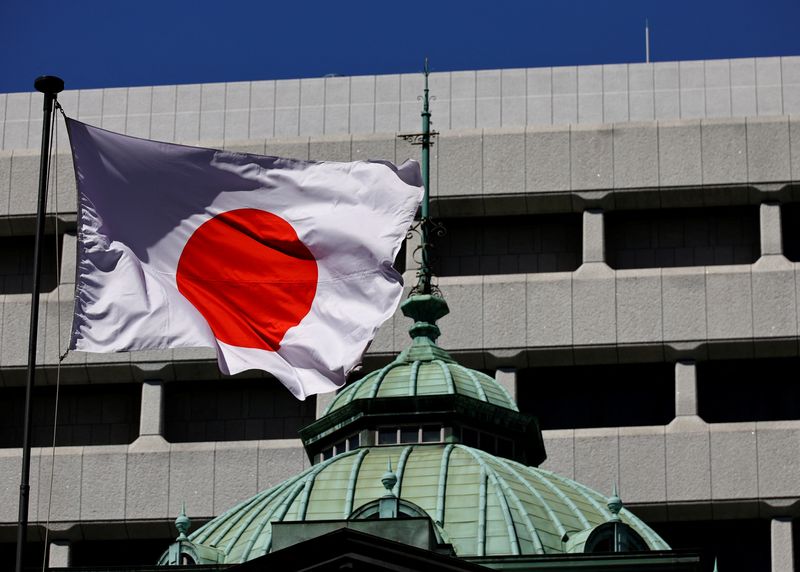By Leika Kihara
TOKYO (Reuters) – The Bank of Japan will release next month its findings on the pros and cons of the various unconventional monetary easing tools used in its 25-year battle with deflation, in another symbolic step towards ending its massive stimulus.
While the BOJ has said the outcome of the review will not have direct implications on near-term monetary policy, it will likely include findings and surveys that justify its plan to steadily proceed with policy normalisation.
The BOJ will release the findings after its final policy meeting of this year on Dec. 18-19, when some analysts expect it to hike interest rates from the current 0.25%.
The review will be the BOJ’s first attempt to take a deeper, analytical look at the drawbacks of prolonged monetary easing.
Notably, it will likely explain how central banks have limited power in changing public perceptions about future price moves, as seen in the mixed results of former Governor Haruhiko Kuroda’s radical stimulus that sought to shock Japan out of a deflationary mindset.
The findings of Governor Kazuo Ueda’s flagship project, which began when he took office in April last year, may offer insight into what tools the BOJ would use – and prefer not to use – in dealing with the next economic downturn.
It may also include hints on what risks the BOJ may focus on as it continues to taper asset buying and raise interest rates from still-near zero levels.
“We hope to provide material that will be useful in thinking about desirable monetary policy in the long run,” BOJ Governor Kazuo Ueda told a news conference on Oct. 31.
The review may become a handy guide for other central banks as an encyclopedia of unconventional easing tools and their efficacy.
Japan’s 25-year experience of deflation and economic stagnation forced the BOJ to become a pioneer of unconventional policies such as zero interest rates and quantitative easing.
Other global central banks later resorted to similar radical measures during severe downturns such as the global financial crisis and COVID pandemic, but have been largely able to exit them fairly quickly when their economies began bouncing back.
As a board member, Ueda played a key role in the BOJ’s introduction in 1999 of forward guidance – or a promise to keep rates low for a prolonged period in hope of stimulating demand.
The most controversial policy came in 2013 when, under Kuroda, the BOJ launched a huge asset-buying scheme that later combined negative interest rates and bond yield control.
As inflation continued to fall short of its 2% target, the BOJ conducted several reviews on the side-effects of prolonged easing, mostly to extend the lifespan of its stimulus.
This time, the review will take a step-back approach on what did not quite work. Specifically, it will explain how Kuroda’s stimulus reflated growth and created jobs, but pushed up inflation only by 0.7 percentage point – not enough to achieve the BOJ’s target.
It will also highlight key flaws such as how the BOJ’s huge asset buying and bond yield cap drained market liquidity, distorted asset pricing, eroded bank profitability and forced financial institutions to increase high-risk lending such as those to the property sector.
Such findings will be based on nearly three dozen academic research papers by its staff, many of which have already been released by the BOJ.
WHAT’S NEXT?
Another takeaway would be findings and surveys showing how Japan is experiencing structural changes that allow for the BOJ to raise borrowing costs.
Among them will be a survey conducted by the BOJ’s branch offices that showed how more companies now see rising prices and wages in a more positive light than in the past.
Other research to be included in the review will explain how a tightening job market and rising material costs are shifting firms away from their long-held aversion to price hikes.
In a speech in May, Deputy Governor Shinichi Uchida said Japan was on the cusp of eradicating a “deflationary norm,” or the perception of households and firms that prices and wages won’t rise much – remarks preluding the review’s highlight.
The BOJ, however, won’t delve into thorny topics such as the cost of its huge holdings of exchange-traded funds (ETF), which could hurt its balance sheet if stock prices tank.
It is also unlikely to offer a pin-point estimate on Japan’s neutral rate of interest, or the rate at which monetary policy is neither contractionary nor expansionary.
The BOJ has not disclosed its own estimate on the neutral rate, which is crucial for gauging how far it may push up borrowing costs. Analysts put it somewhere around 1%, well above the BOJ’s current policy rate of 0.25%.
Taken together, the review will aim at taking a neutral, scientific view over the controversy surrounding the BOJ’s radical stimulus that led a deep and sometimes emotional rift between its proponents and critics.
“There won’t be straight answers to many of the issues the review touches on. But the point was to hold discussions on past monetary easing steps and highlight some positive changes happening in the economy,” said Mari Iwashita, chief market economist at Daiwa Securities and a veteran BOJ watcher.
“It’s a good way to move on and comes at a nice timing, when Japan is finally seeing early signs of sustained inflation.”

